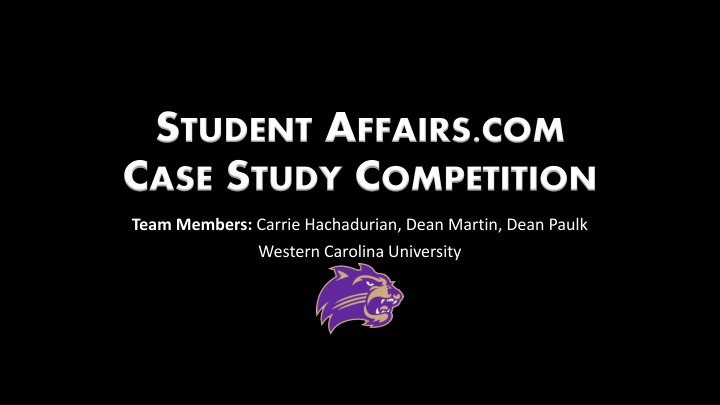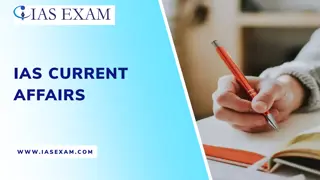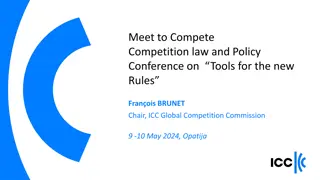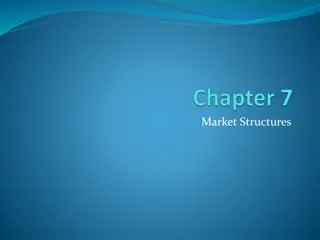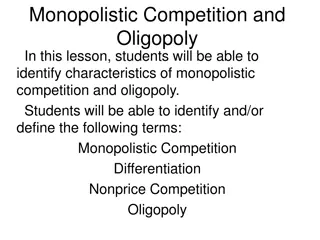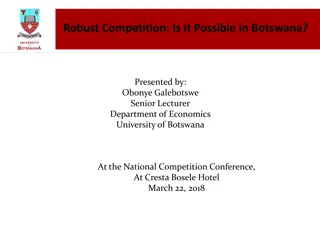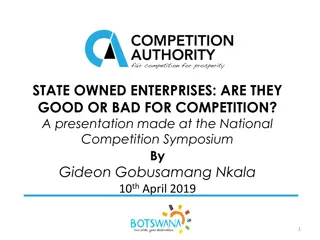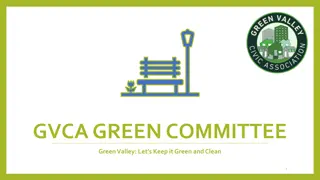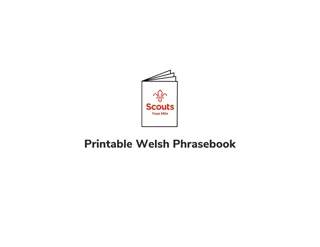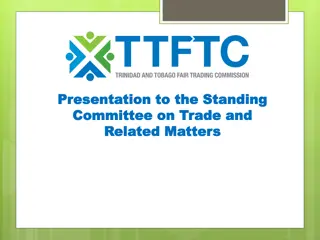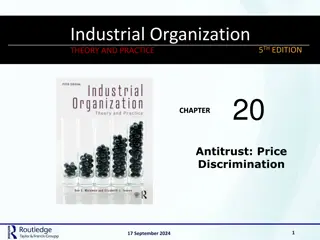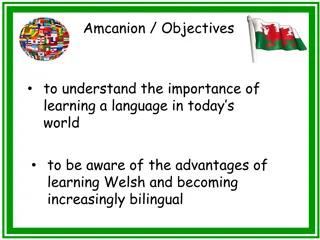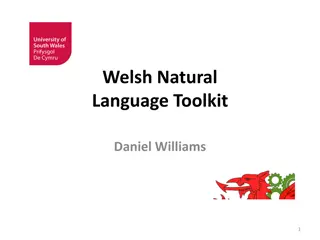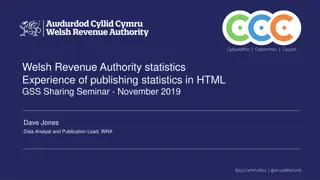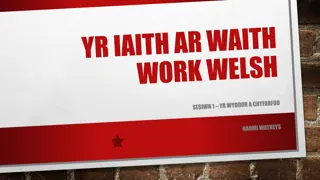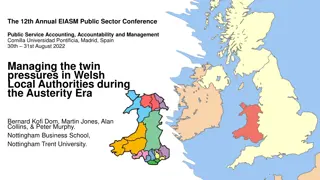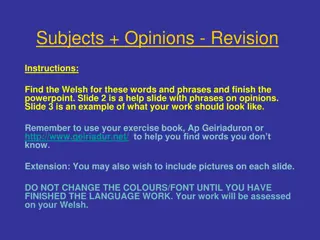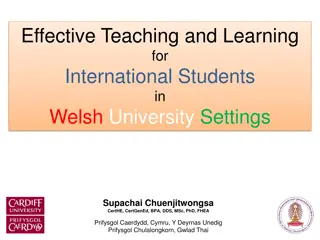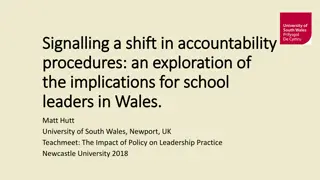Student Affairs Competition at American Welsh Green University
This case study competition at American Welsh Green University involves a team consisting of Carrie Hachadurian, Dean Martin, and Dean Paulk. The university, located in North Carolina, emphasizes training in wizardry and witchcraft to support comprehensive student learning and development. The team members belong to various houses like Ravenclaw, Gryffindor, and Hufflepuff. The university promotes diversity and inclusion among students. The breakdown from the 2017 elections shows a mix of political affiliations, with a significant unaffiliated percentage. The university's policies focus on promoting effective use of facilities and resources, with a specific policy on conferences and events. Additionally, free speech policies at the University of Tennessee encourage free expression and critical judgment among students.
Download Presentation

Please find below an Image/Link to download the presentation.
The content on the website is provided AS IS for your information and personal use only. It may not be sold, licensed, or shared on other websites without obtaining consent from the author.If you encounter any issues during the download, it is possible that the publisher has removed the file from their server.
You are allowed to download the files provided on this website for personal or commercial use, subject to the condition that they are used lawfully. All files are the property of their respective owners.
The content on the website is provided AS IS for your information and personal use only. It may not be sold, licensed, or shared on other websites without obtaining consent from the author.
E N D
Presentation Transcript
STUDENT AFFAIRS.COM CASE STUDY COMPETITION Team Members: Carrie Hachadurian, Dean Martin, Dean Paulk Western Carolina University
MEET THE TEAM Dolores Hackenberry (Carrie Hachadurian) Ravenclaw: Class of 2019 Dedalus MacNair (Dean Martin) Gryffindor: Class of 2019 Dobby Peasegood (Dean Paulk) Hufflepuff: Class of 2019
ABOUT AMERICAN WELSH GREEN UNIVERSITY American Welsh Green University is a small private undergraduate student affairs institution located in North Carolina. AWGU utilizes training and practice in wizardry and witchcraft to advance and support holistic student learning and development. Nestled in the Smoky Mountains, AWGU has a century of history in preparing tomorrow s student affairs witches and wizards with a strong focus on community engagement and scholarship. AWGU places high value on promoting diversity and inclusion of our students, no matter their age, skin color, ethnicity, national origin, disability, marital status, gender identity, gender presentation, political affiliation, faith, sexual orientation, veteran status, blood status, other identity category not listed above.
BREAKDOWN(FROM 2017 ELECTIONS @ AWGU POLLING SITE) Libertarian Democrat Democrat: 793 (30.3%) Republican: 632 (24.1%) Unaffiliated: 1149 (43.9%) Libertarian: 44 (1.7%) Unaffiliated Republican
CURRENT AWGU POLICY University Policy #105: Conferences and Events: It is the policy of American Welsh Green University (the "University") to promote and facilitate the most effective and efficient use of its facilities, property, and resources in furtherance of its mission. Toward this end, the purpose of this policy and implementing procedures is to ensure the best service to internal and external customers alike through coordinated scheduling and the use of University facilities, spaces, resources, and support staff.
SELECTED FREE SPEECH POLICIES UNIVERSITY OF TENNESSEE (KNOXVILLE): Speech Code Category: Advertised Commitments to Free Expression, Protest and Demonstration Policies Last updated: September 18, 2017 Because free inquiry and free expression are indispensable to the attainment of the goals of a university, The University of Tennessee encourages students to develop the capacity for critical judgment and to engage in an independent search for truth. The institution supports the rights of students and other members of The University of Tennessee community to express freely their views for or against actions and opinions with which they agree or disagree. 1. Student gatherings may be conducted in areas which are generally available to the public, provided such gatherings: A. Are conducted in an orderly and peaceful manner. B. In no way obstruct vehicular or pedestrian traffic. C. Do not interfere with classes, scheduled meetings, events and ceremonies or with other essential processes of the university. D. If inside a building, are held in an assigned meeting room The distribution of leaflets and handbills and the circulation of petitions on campus shall be free and unhindered. Any material to be distributed should be in accordance with the applicable local, state, and federal laws.
SELECTED FREE SPEECH POLICIES JAMES MADISON UNIVERSITY: Speech Code Category: Protest and Demonstration Policies Last updated: August 22, 2017 JMU seeks to preserve students privileges to take active roles in exercising their rights of expression, conscience, affiliation, and peaceful assembly. At the same time, the university also recognizes its responsibility to ensure the rights and freedom of those who want to pursue their educational interest without interference. The following restrictions are designed to be in compliance with the Code of Virginia section 23-9.2:13 and are narrowly tailored to serve the University s interest of maintaining the educational and business operations of the university without regard to the content of such expression. J32-103 Blocking or impeding vehicular or pedestrian traffic is prohibited. J32-104 Blocking access to or from campus buildings or offices is prohibited. J32-106 Observers may not interfere with participants of the demonstration or assembly in any way. J32-107 Activities of participants or observers that disrupt or disturb classes, meetings or any other normal functions of the university are prohibited. J32-108 All individuals participating in or observing a demonstration or peaceful assembly must comply with any request of campus police. J32-109 Bannering or picketing that interferes with the normal operations of the buildings will not be permitted.
SELECTED FREE SPEECH POLICIES WILLIAM AND MARY: Speech Code Category: Protest and Demonstration Policies Last updated: September 1, 2017 A. Prior Scheduling Is Generally Required. Except for spontaneous activities permitted under paragraph B, below, groups and individuals desiring to use university space and facilities must submit requests through the Scheduling Office as far in advance as practical. Any requests not received sufficiently in advance to permit necessary evaluation and determine the appropriate location, applying the standards outlined in this section III, may be denied for that reason. B. Spontaneous Expressive Activities Permitted in Certain Circumstances and Locations. William & Mary employees, students, and recognized student organizations may engage in spontaneous or unscheduled expressive events and activities in two situations: A number of areas are available, on a first-come-first-serve basis, for rallies, assemblies, demonstrations, vigils and other outdoor expressive activities without prior approval or scheduling. A current list of areas designated for spontaneous activities is available from the Scheduling Office. Spontaneous expressive activities may occur in other locations (a location other than those designated by the Scheduling Office) when advance scheduling is not practical, such as an activity responding to a university action, if (a) the designated locations are already in use or reserved for another activity, (b) the spontaneous activity is too large for the designated locations, or (c) the expressive value of the activity is significantly enhanced by it taking place in a different location, such as a protest against a specific office, which would be more powerful if held outside of or near to the office. If a spontaneous expressive activity does not satisfy these conditions, disrupts university operations or creates a safety hazard, university officials will require the activity to be relocated or rescheduled.
SELECTED FREE SPEECH POLICIES UNIVERSITY OF MISSISSIPPI: Speech Code Category: Protest and Demonstration Policies Last updated: August 21, 2017 To facilitate robust debate and the free exchange of ideas, the University has established high visibility areas on campus as Speaker s Corners. These areas may be used by any person, including non-students and other campus guests. This use may be without permission from the University so long as: the area has not been previously reserved or scheduled for a particular function no sound amplification is used participants do not violate other University policies Designated Speaker s Corners include: the area surrounding the flagpole in the Lyceum Circle the plaza in front of Fulton Chapel the Union Plaza; specifically, the walkway strip between the Walk of Champions and the back entrance to Croft NOTE: Due to the Union construction, the Union Plaza will be offline for use beginning December 15, 2016. Because of this, an alternative area will be designated. Please contact the Office of the Dean of Students at 662.915.7247 for alternative locations. Although it is not necessary for a person using one of the designated Speaker s Corners to obtain prior permission from the University, such persons are encouraged to contact the Office of the Dean of Students for scheduling purposes to minimize possible conflicts. Nothing in this section shall be interpreted as limiting the right of student expression elsewhere on campus so long as the expressive activities or related student conduct do not violate any other applicable University policies.
SELECTED FREE SPEECH POLICIES UNIVERSITY OF VIRGINIA: Speech Code Category: Advertised Commitments to Free Expression Last updated: September 23, 2016 The University of Virginia is a community of scholars in which the ideals of freedom of inquiry, freedom of thought, freedom of expression, and freedom of the individual are sustained. The University is committed to supporting the exercise of any right guaranteed to individuals by the Constitution and the Code of Virginia and to educating students relative to their responsibilities. Speech Code Category: Policies on Bias and Hate Speech Last updated: September 26, 2017 The University defines a bias complaint as any report of a threat or act of harassment or intimidation verbal, written or physical which is personally directed against or targets a University of Virginia student because of that student s age, color, disability, marital status, national or ethnic origin, political affiliation, race, religion, sex (including pregnancy), sexual orientation, veteran status or family medical or genetic information. This definition is used for reporting and statistical purposes only. It carries no independent sanctioning weight or authority. The University encourages prompt reporting of bias complaints so that it can evaluate the alleged facts for possible violation(s) of University policy, including the Standards of Conduct, and refer such complaints to law enforcement when an independent investigation for violation(s) of criminal law may be warranted. Although the expression of an idea or point of view may be offensive or inflammatory to some, it is not necessarily a violation of law or University policy. The University values and embraces the ideals of freedom of inquiry, freedom of thought, and freedom of expression, all of which must be vitally sustained in a community of scholars. While these freedoms protect controversial ideas and differing views, and sometimes even offensive and hurtful words, they do not protect personal threats or acts of misconduct which violate criminal law or University policy.
ALLOWING CONTENTIOUS SPEAKERSON CAMPUS PROS: Higher education is the natural site for opposing ideas and remain among the few places where debates are held in person (Goldberg, 2018) Allowing civil discourse fits in with higher education s mission to present various viewpoints and sharpen students critical thinking skills (Goldberg, 2018) CONS: Administrators would need to define which topics are OK to discuss and which are not Increased costs for additional security (Goldberg, 2018) Could be held liable for hostile environments created by others (Goldberg, 2018) Could invite pseudoscience or otherwise fake news to campus, igniting further debate (Goldberg, 2018) Disinviting speakers only fuels their fire and their weapon is social media (Goldberg, 2018)
ENTITLEMENTOF HIGHER EDUCATION Campuses have the right to discretion in determining what activities support their mission (Goldberg, 2018) Public Must take into consideration First Amendment rights of all students But can limit speakers during certain times of year (exam week, for example) or to minimize disruption to the educational process (Goldberg, 2018) Private more freedom in choosing what to allow/ not allow.
PRECEDENTED INCIDENCES Stacy v. Williams (1969) Brooks v. Auburn University (1969) Catholic University San Marcos University UC Berkley Middlebury College
HOW SHOULD INSTITUTIONS RESPOND?: A MULTITUDEOF PERSPECTIVES Allow controversial speaker to present on campus, but invite someone with opposing viewpoints to also speak on campus Not necessarily at the same time Allows for varying perspectives in nondiscriminatory fashion Allow controversial speakers of opposing viewpoints to speak, but require an unbiased moderator and lay out ground rules for discussion or protests Teaches and encourages civil discourse Everyone is heard Allow controversial speakers under the condition they may not incite violence or harassment Being offended is not the same as being harassed Institutions should reiterate their core values and specific policies surrounding controversial speakers
WHATIS FREE SPEECH? FREEDOM OF SPEECH INCLUDES THE RIGHT: Not to speak (specifically, the right not to salute the flag). West Virginia Board of Education v. Barnette, 319 U.S. 624 (1943) Of students to wear black armbands to school to protest a war ( Students do not shed their constitutional rights at the schoolhouse gate. ). Tinker v. Des Moines, 393 U.S. 503 (1969) To use certain offensive words and phrases to convey political messages. Cohen v. California, 403 U.S. 15 (1971) To contribute money (under certain circumstances) to political campaigns. Buckley v. Valeo, 424 U.S. 1 (1976) To advertise commercial products and professional services (with some restrictions). Virginia Board of Pharmacy v. Virginia Consumer Council, 425 U.S. 748 (1976); Bates v. State Bar of Arizona, 433 U.S. 350 (1977) To engage in symbolic speech, (e.g., burning the flag in protest). Texas v. Johnson, 491 U.S. 397 (1989); United States v. Eichman, 496 U.S. 310 (1990) FREEDOM OF SPEECH DOES NOT INCLUDE THE RIGHT: To incite actions that would harm others (e.g., [S]hout[ing] fire in a crowded theater. ). Schenck v. United States, 249 U.S. 47 (1919) To make or distribute obscene materials. Roth v. United States, 354 U.S. 476 (1957) To burn draft cards as an anti-war protest. United States v. O Brien, 391 U.S. 367 (1968) To permit students to print articles in a school newspaper over the objections of the school administration. Hazelwood School District v. Kuhlmeier, 484 U.S. 260 (1988) Of students to make an obscene speech at a school-sponsored event. Bethel School District #43 v. Fraser, 478 U.S. 675 (1986) Of students to advocate illegal drug use at a school-sponsored event. Morse v. Frederick, __ U.S. __ (2007) Retrieved from http://www.uscourts.gov/about-federal-courts/educational-resources/about- educational-outreach/activity-resources/what-does
PROPOSED POLICY The American Welsh Green University seeks to promote an environment of freedom of inquiry, thought, affiliation, and expression. Therefore, AWGU encourages our students to participate in peacefully assembly, critical reflection and judgement, and the independent search for one s own truth. AWGU will abide by all Constitutional rights, and does not have a policy of restricting the practice of free speech. 1. Student gatherings may be conducted in areas which are generally available to the public, provided such gatherings: A. Are conducted in an orderly and peaceful manner. B. Do not obstruct vehicular or pedestrian traffic. C. Do not interfere with classes, scheduled meetings, events, or with other essential processes of the university. D. If inside a building, are held in a space that has been reserved for the gathering or in a common area that is not reserved for other purposes. AWGU students are encouraged to submit an official bias report if they feel as if they are being personally targeted on the basis of their age, skin color, ethnicity, national origin, disability, marital status, gender identity, gender presentation, political affiliation, faith, sexual orientation, veteran status, blood status, other identity category not listed above. Bias reports can be submitted via the bias reporting portal at bias.awgu.edu. AWGU encourages prompt submission of bias reports so that the report can be evaluated for possible violation(s) of University policy and make referrals to law enforcement when warranted. Although the expression of one s idea or point of view may be offensive or inflammatory to some, it may not pose a violation of state, federal, or ministry of magic law or AWGU policy. AWGU values and embraces freedom of inquiry, thought, affiliation, and expression, all of which must be vitally sustained in a community of scholars. While these freedoms protect controversial ideas and differing views, and sometimes even offensive and hurtful words, they do not protect personal threats or acts of misconduct which violate criminal law or AWGU policy and should be reported via the bias reporting system at bias.awgu.edu.
REFERENCES Foundation for Individual Rights in Education. (2012). FIRE s seven best colleges for free speech 2012. Retrieved from https://www.thefire.org/fires-seven-best-colleges-for-free-speech-2012/ Goldberg, S. B. (2018). Free expression on campus: Mitigating the costs of contentious speakers. Harvard Journal of Law and Public Policy, 41, pp. 163-186. Retrieved from http://www.harvard-jlpp.com/wp-content/uploads/2018/01/Goldberg_FINAL.pdf Haight, W. H. (2004). Can a campus ban controversial speakers? Perspective, 19(11). McMurtrie, B. (2017). Mayhem at Berkley hardens new battle lines on free speech. In (no editors) Controversial Speakers on Campus. The Chronicle of Higher Education. Retrieved from http://www.chronicle.com/items/biz/resource/ChronFocus_ControversialSpeakersv3_i.pdf Read, R. (2017). A scuffle and a professor s injury make Middlebury a free-speech flashpoint. In (no editors) Controversial Speakers on Campus. The Chronicle of Higher Education. Retrieved from http://www.chronicle.com/items/biz/resource/ChronFocus_ControversialSpeakersv3_i.pdf United States Courts. (n.d.). What does free speech mean? Retrieved from http://www.uscourts.gov/about-federal- courts/educational-resources/about-educational-outreach/activity-resources/what-does [Untitled illustration of the Hogwarts house emblems]. Retrieved February 12, 2018 from http://pottermoreforum.net/viewtopic.php?t=8485 Western Carolina University. (2015). University policy #110. Retrieved from https://www.wcu.edu/discover/leadership/office-of- the-chancellor/legal-counsel-office/university-policies/numerical-index/university-policy-110.asp
